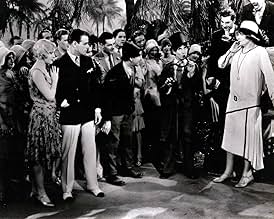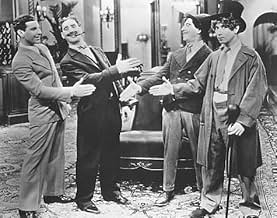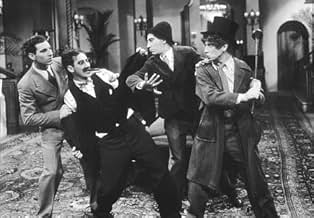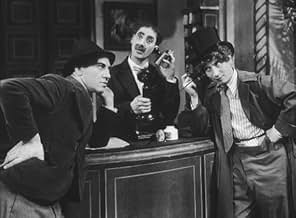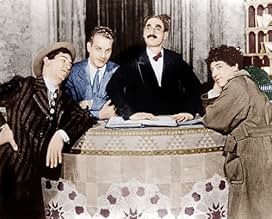CALIFICACIÓN DE IMDb
6.8/10
8.6 k
TU CALIFICACIÓN
Groucho es el director del hotel "Los Cuatro Cocos" que atraviesa dificultades. Debido a una quiebra, se procede a la subasta del hotel por parcelas, la cosa se complica con la llegada de Ch... Leer todoGroucho es el director del hotel "Los Cuatro Cocos" que atraviesa dificultades. Debido a una quiebra, se procede a la subasta del hotel por parcelas, la cosa se complica con la llegada de Chico y Harpo, y el robo de un valioso collar.Groucho es el director del hotel "Los Cuatro Cocos" que atraviesa dificultades. Debido a una quiebra, se procede a la subasta del hotel por parcelas, la cosa se complica con la llegada de Chico y Harpo, y el robo de un valioso collar.
- Dirección
- Guionistas
- Elenco
- Premios
- 2 nominaciones en total
Groucho Marx
- Hammer
- (as Marx Brothers)
Harpo Marx
- Harpo
- (as Marx brothers)
Chico Marx
- Chico
- (as Marx Brothers)
Zeppo Marx
- Jamison
- (as Marx Brothers)
Gamby-Hale Ballet Girls
- Dancers
- (as Gamby-Hale Girls)
Dolores Hope
- Dancer
- (sin créditos)
Sylvan Lee
- Bell Captain
- (sin créditos)
Barton MacLane
- Lifeguard
- (sin créditos)
- Dirección
- Guionistas
- Todo el elenco y el equipo
- Producción, taquilla y más en IMDbPro
Opiniones destacadas
It's been suggested by more than one intelligent film critic that the Golden Age of movie comedies ended with the arrival of sound. Probably the earliest definitive refutation of that is this 1929 film introducing motion-picture audiences to the Marx Brothers.
The great Florida land boom has yet to hit the swampy resort town of Coconut Beach, where hotel owner Mr. Hammer (Groucho) and his assistant (Zeppo) deal with a paucity of paying guests and a platoon of bellhops who haven't been paid in weeks. Hammer manages to placate them ("You wanna be wage slaves? And what makes wage slaves? Wages!") but finds two new arrivals (Chico and Harpo) less easy to sucker while he tries to marry into the wealthy arms of the widow Mrs. Potter (Margaret Dumont).
It may be the Marxes' least revered film from their Zeppo period, but this, the earliest surviving comedy of theirs, provides more than quaint curio appeal or historic interest. It's a nice transfer of their stage act, using one of their successful Broadway plays with nifty direction by Robert Florey and Joseph Santley. While hobbled by early sound technology, there are plenty of neat camera tricks and a less static composition than on offer in the next, more heralded, Marx Brothers film, "Animal Crackers," with overhead shots and cutaways. And the antic wordplay, especially from Groucho, is so fast and dense it provides fresh laughs even after five or six screenings.
I even like the singing and dancing, especially an opening number, shot on a soundstage in Queens, N.Y. but dressed to resemble either Florida or a Haircut 100 video. The "let-us-entertain-you" spirit on ample evidence here evokes a fast-fading pre-Depression giddiness where flappers with wide hips and small chests bat eyes at derby-wearing men glad for the attention.
The Brothers themselves don't really need the help, their craft honed to perfection on stage that they clearly know where the laughs are. Groucho and Chico perform one of their classic routines, the "Viaduct/Why A Duck" number, while Harpo does some prime gurning and props his knee upon every passing dame (and some guys).
Groucho takes a look at Chico and Harpo's lone suitcase when they check in.
"That bag's empty!"
"We fill it up before we leave," answers Chico.
The most glaring weakness of "Cocoanuts" is a lamer-than-usual romantic subplot. Allan Jones and Kitty Carlisle slowed things down in "Night At The Opera," but at least they could sing, unlike Mary Eaton and Oscar Shaw, whose caterwauling here may attract dogs to your doorstep from a mile away. Irving Berlin's score is amazing for its inanity. Though "Monkey-Doodle-Doo" isn't quite as bad as its title, it sounds like "Blue Skies" compared to "When My Dreams Come True" a lifeless ballad reprised five (!) times in the picture, including twice by Harpo (once each on oboe and harp).
Dumont is not yet the presence she became in later Marx films, but Kay Francis offers an attractive foil to the Boys as a designing woman who bites off more than she can chew trying to make a stooge of Harpo. Audiences may start off thinking Basil Ruysdael is just another straight man playing a suspicious cop, but the joke's on us, as we discover by the end.
Speaking of straight men, this may be Zeppo's finest film, if you go along with those who argue he was the master of minimalist comedy, serving up subtle metahumor in the face of his brothers' hi-jinks by literally doing nothing on screen. Not until "Night At The Opera," in which he set a new standard by not appearing at all, would Zeppo be quite this masterful again.
The great Florida land boom has yet to hit the swampy resort town of Coconut Beach, where hotel owner Mr. Hammer (Groucho) and his assistant (Zeppo) deal with a paucity of paying guests and a platoon of bellhops who haven't been paid in weeks. Hammer manages to placate them ("You wanna be wage slaves? And what makes wage slaves? Wages!") but finds two new arrivals (Chico and Harpo) less easy to sucker while he tries to marry into the wealthy arms of the widow Mrs. Potter (Margaret Dumont).
It may be the Marxes' least revered film from their Zeppo period, but this, the earliest surviving comedy of theirs, provides more than quaint curio appeal or historic interest. It's a nice transfer of their stage act, using one of their successful Broadway plays with nifty direction by Robert Florey and Joseph Santley. While hobbled by early sound technology, there are plenty of neat camera tricks and a less static composition than on offer in the next, more heralded, Marx Brothers film, "Animal Crackers," with overhead shots and cutaways. And the antic wordplay, especially from Groucho, is so fast and dense it provides fresh laughs even after five or six screenings.
I even like the singing and dancing, especially an opening number, shot on a soundstage in Queens, N.Y. but dressed to resemble either Florida or a Haircut 100 video. The "let-us-entertain-you" spirit on ample evidence here evokes a fast-fading pre-Depression giddiness where flappers with wide hips and small chests bat eyes at derby-wearing men glad for the attention.
The Brothers themselves don't really need the help, their craft honed to perfection on stage that they clearly know where the laughs are. Groucho and Chico perform one of their classic routines, the "Viaduct/Why A Duck" number, while Harpo does some prime gurning and props his knee upon every passing dame (and some guys).
Groucho takes a look at Chico and Harpo's lone suitcase when they check in.
"That bag's empty!"
"We fill it up before we leave," answers Chico.
The most glaring weakness of "Cocoanuts" is a lamer-than-usual romantic subplot. Allan Jones and Kitty Carlisle slowed things down in "Night At The Opera," but at least they could sing, unlike Mary Eaton and Oscar Shaw, whose caterwauling here may attract dogs to your doorstep from a mile away. Irving Berlin's score is amazing for its inanity. Though "Monkey-Doodle-Doo" isn't quite as bad as its title, it sounds like "Blue Skies" compared to "When My Dreams Come True" a lifeless ballad reprised five (!) times in the picture, including twice by Harpo (once each on oboe and harp).
Dumont is not yet the presence she became in later Marx films, but Kay Francis offers an attractive foil to the Boys as a designing woman who bites off more than she can chew trying to make a stooge of Harpo. Audiences may start off thinking Basil Ruysdael is just another straight man playing a suspicious cop, but the joke's on us, as we discover by the end.
Speaking of straight men, this may be Zeppo's finest film, if you go along with those who argue he was the master of minimalist comedy, serving up subtle metahumor in the face of his brothers' hi-jinks by literally doing nothing on screen. Not until "Night At The Opera," in which he set a new standard by not appearing at all, would Zeppo be quite this masterful again.
A lot of people don't find The Cocoanuts to be as entertaining as some of the later Marx Brothers films. Maybe not, but it definitely comes close. Personally, I thought this was the Marx Brothers' fifth best film. It's not that it's bad, because it great, but it's just not as good as some of the others, that's all.
As several other people have said, it really doesn't stand up technically as well as most of the others, but that has nothing to do with the quality of the script, which is just great. I truly believe that if I had seen this in 1929, I would have been as hooked on the Marxes as I am now.
There are many great bits in this movie, including the first scene between Groucho and Chico, the Auction, the connected bedroom thing, and the first time we ever see Groucho do his thing with Margaret Dumont. But the only scene in this movie to make my personal Ten Best Marx Scenes is the Why-A-Duck routine. Genius, it's just pure genius. That's my only word for it.
Harpo really doesn't have a lot of good stuff in this movie. He's great in what he doesn't have, but he really shines in Monkey Business and Duck Soup. Those are his two best performances, if you ask me. If you are looking for classic Harpo, I'd suggest watching either of those. Also, Zeppo, obviously, has nothing to do. But then, what did you expect?
This movie has a few actually rather unfunny spots in it, but you can blame that on the fact that this is the brothers' first movie, and they are still getting used to the camera. But it has a lot more comedy than non-comedy and is still a whole lot better than most of the "comedies" that are coming out nowadays.
This may sound a little strange, but if you have never seen a Marx Brothers movie, I suggest watching this one first. It's a lot more enjoyable if you aren't expecting it to be equal to Duck Soup or Animal Crackers. Because it's not. But, as I can not stress enough, it is still worth checkout, and better than than anything they did post-A Night at the Opera.
Well, it's the Marx Brothers best movie of the 20's, anyway.
8/10
As several other people have said, it really doesn't stand up technically as well as most of the others, but that has nothing to do with the quality of the script, which is just great. I truly believe that if I had seen this in 1929, I would have been as hooked on the Marxes as I am now.
There are many great bits in this movie, including the first scene between Groucho and Chico, the Auction, the connected bedroom thing, and the first time we ever see Groucho do his thing with Margaret Dumont. But the only scene in this movie to make my personal Ten Best Marx Scenes is the Why-A-Duck routine. Genius, it's just pure genius. That's my only word for it.
Harpo really doesn't have a lot of good stuff in this movie. He's great in what he doesn't have, but he really shines in Monkey Business and Duck Soup. Those are his two best performances, if you ask me. If you are looking for classic Harpo, I'd suggest watching either of those. Also, Zeppo, obviously, has nothing to do. But then, what did you expect?
This movie has a few actually rather unfunny spots in it, but you can blame that on the fact that this is the brothers' first movie, and they are still getting used to the camera. But it has a lot more comedy than non-comedy and is still a whole lot better than most of the "comedies" that are coming out nowadays.
This may sound a little strange, but if you have never seen a Marx Brothers movie, I suggest watching this one first. It's a lot more enjoyable if you aren't expecting it to be equal to Duck Soup or Animal Crackers. Because it's not. But, as I can not stress enough, it is still worth checkout, and better than than anything they did post-A Night at the Opera.
Well, it's the Marx Brothers best movie of the 20's, anyway.
8/10
"The Coconuts", being the Marx Brothers' first film, is bound to be a little creaky. This does not mean you should miss it, however! Groucho delivers some of his most scathing one-liners, Harpo provides a perfect blend of devilry and sympathy, and Chico struts like a peacock. Even the fabulous Margaret Dumont gets in on the action, telling her warbling daughter to "stop singing on the beach at all hours" after one truly atrocious song. What brings this film down is bad editing and the godawful songs--Mary Eaton singing "Do the Monkey Doodle Do"--say WHAT!?!? The dancing is,as Groucho states, "A little entertainment--very little." And Harpo's harp solo was really just pasted in there. Stay away from the fast-forward button, though--the songs are just as laughable as the jokes(for all the wrong reasons, of course), as is Kay Francis's drag queen-esque performance. And don't miss the show-stopper "I want my shirt!" My sister and I were rolling on the ground laughing. The love couple is truly nauseating, but a touching moment is provided when the childlike Harpo comforts a heartbroken Mary Eaton. Full of vaudevillian jokes and biting one-liners, this is definitely a film no Marx Brothers fan should miss!
The creative talents of George S. Kaufman, Irving Berlin, and the Brothers Marx went into the production of the Broadway musical The Cocoanuts which ran for 216 shows in the 1925-1926 season. Of the talent involved it was the Marx Brothers who came out the winners.
George S. Kaufman was one of the great wits of the last century, but so were the Marx Brothers. They ad-libbed and eliminated much of Kaufman's well turned prose and things were pretty tense between him and the brothers on Broadway. He also did not like a certain song that Berlin wanted to use in The Cocoanuts and Berlin took it from the show after Kaufman ragged on him. The song was Always. The Cocoanuts was the first book musical that Irving Berlin ever wrote, he did mostly reviews before The Cocoanuts. It also is the only one without a single hit song from it.
But as a Marx Brothers comedy it made the Brothers reputations. The plot such as it is concerns the boom in Florida real estate in which a lot of people got wealthy and a lot lost their shirts, though not quite in the way Basil Ruysdael does when Harpo and Chico take it off his back while he's trying to frisk them in his duties as the house detective.
The Cocoanuts was shot at the Paramount Astoria studio in Queens and used a lot of Broadway performers in the roles. Besides the Brothers, only Margaret Dumont and Basil Ruysdael came over from the Broadway cast. But Oscar Shaw and Mary Eaton had well established reputations on Broadway. Kay Francis is in the cast as the bad girl and she certainly went on to a substantial Hollywood career.
The main thing The Cocoanuts has going for it besides the Marx Brothers is the fact it is a filmed record of a Twenties era Broadway musical. Paramount made very few concessions in adapting The Cocoanuts to the screen. What we see is filmed play. Historic, but I fear not as entertaining as the later work of the Marx Brothers.
George S. Kaufman was one of the great wits of the last century, but so were the Marx Brothers. They ad-libbed and eliminated much of Kaufman's well turned prose and things were pretty tense between him and the brothers on Broadway. He also did not like a certain song that Berlin wanted to use in The Cocoanuts and Berlin took it from the show after Kaufman ragged on him. The song was Always. The Cocoanuts was the first book musical that Irving Berlin ever wrote, he did mostly reviews before The Cocoanuts. It also is the only one without a single hit song from it.
But as a Marx Brothers comedy it made the Brothers reputations. The plot such as it is concerns the boom in Florida real estate in which a lot of people got wealthy and a lot lost their shirts, though not quite in the way Basil Ruysdael does when Harpo and Chico take it off his back while he's trying to frisk them in his duties as the house detective.
The Cocoanuts was shot at the Paramount Astoria studio in Queens and used a lot of Broadway performers in the roles. Besides the Brothers, only Margaret Dumont and Basil Ruysdael came over from the Broadway cast. But Oscar Shaw and Mary Eaton had well established reputations on Broadway. Kay Francis is in the cast as the bad girl and she certainly went on to a substantial Hollywood career.
The main thing The Cocoanuts has going for it besides the Marx Brothers is the fact it is a filmed record of a Twenties era Broadway musical. Paramount made very few concessions in adapting The Cocoanuts to the screen. What we see is filmed play. Historic, but I fear not as entertaining as the later work of the Marx Brothers.
I've been told it's the first musical comedy to have been made. God only knows what that makes The Jazz Singer then - heavyweight drama, I suppose.
The first problem you're going to have if you want to see it is actually seeing it. The film has been very hard to find on DVD. A copy is now available on the recently released version of the UK box set of their early films but as yet has not been released on it's own. I believe this situation varies elsewhere in the world.
The second problem you'll have if you want to see it is actually seeing it. Beware cheap copies from distant lands. The film has fallen into disrepair due to neglect. This has meant that some copies of the film are almost totally unwatchable. I remember being given a copy of the film that was released in Australia where parts of the picture had been almost completely washed away while the soundtrack could barely be heard of the crackles of the tape.
Still, if you do find a good copy it is well worth watching. The filming is very static and the acting wooden in comparison to their later movies. However, given that this was their first release and based upon their second successful Broadway run, I think that can be forgiven.
The characters are already clearly drawn out and some of the sketches are as funny as anything they did later on in their career. The 'Why a Duck' sketch can rate along side the 'tootsie-frootsie' sketch as one of the best sketches between Groucho and Chico.
The music is forgettable, the plot wafer thin, but you'll laugh out loud more than the majority of the films you'll ever see.
The first problem you're going to have if you want to see it is actually seeing it. The film has been very hard to find on DVD. A copy is now available on the recently released version of the UK box set of their early films but as yet has not been released on it's own. I believe this situation varies elsewhere in the world.
The second problem you'll have if you want to see it is actually seeing it. Beware cheap copies from distant lands. The film has fallen into disrepair due to neglect. This has meant that some copies of the film are almost totally unwatchable. I remember being given a copy of the film that was released in Australia where parts of the picture had been almost completely washed away while the soundtrack could barely be heard of the crackles of the tape.
Still, if you do find a good copy it is well worth watching. The filming is very static and the acting wooden in comparison to their later movies. However, given that this was their first release and based upon their second successful Broadway run, I think that can be forgiven.
The characters are already clearly drawn out and some of the sketches are as funny as anything they did later on in their career. The 'Why a Duck' sketch can rate along side the 'tootsie-frootsie' sketch as one of the best sketches between Groucho and Chico.
The music is forgettable, the plot wafer thin, but you'll laugh out loud more than the majority of the films you'll ever see.
¿Sabías que…?
- TriviaDuring the "Why a duck?" sequence, it seems that Groucho Marx almost calls Chico Marx "Ravelli", which is Chico's character in Animal Crackers. Since they were shooting The Cocoanuts in the morning and acting in Animal Crackers at night, this mix up is understandable.
- ErroresIn the opening scene, Hammer sends Jamison to meet a 4:15 train. When Jamison gets back, he refers to it as a 4:30 train.
- Créditos curiososThe opening credits are run against a background of negative film of the "Monkey-Doodle-Doo" number.
- Versiones alternativasDeleted Scenes:
- When the bellboys are protesting against being unpaid, Zeppo tells them that Groucho has yet to arise at four in the afternoon. His comforting postscript, that Groucho always gets up on Wednesday, precedes his arrival. This scene was shot, but later cut after the preview, leaving Groucho descending down the stairs, still putting on his coat, allowing time to ward off his staff to catch a 4:15 train.
- Another item that was cut from the preview version of the film was a love ballad sung by Groucho to Margaret Dumont entitled "A Little Bungalow". Originally sung in the play by the romantic leads Polly Potter and Robert Adams, the song slowed up the picture.
- ConexionesFeatured in 46th Annual Academy Awards (1974)
- Bandas sonorasFLORIDA BY THE SEA
(1925) (uncredited)
Written by Irving Berlin
Sung off-screen by chorus
Danced by Gamby-Hale Ballet Girls and Allan K. Foster Girls
Selecciones populares
Inicia sesión para calificar y agrega a la lista de videos para obtener recomendaciones personalizadas
- How long is The Cocoanuts?Con tecnología de Alexa
Detalles
- Fecha de lanzamiento
- País de origen
- Idioma
- También se conoce como
- The Cocoanuts
- Locaciones de filmación
- Kaufman Astoria Studios - 3412 36th Street, Astoria, Queens, Nueva York, Nueva York, Estados Unidos(Paramount Astoria Studios site)
- Productora
- Ver más créditos de la compañía en IMDbPro
Taquilla
- Presupuesto
- USD 500,000 (estimado)
- Total a nivel mundial
- USD 57
- Tiempo de ejecución
- 1h 36min(96 min)
- Color
Contribuir a esta página
Sugiere una edición o agrega el contenido que falta


